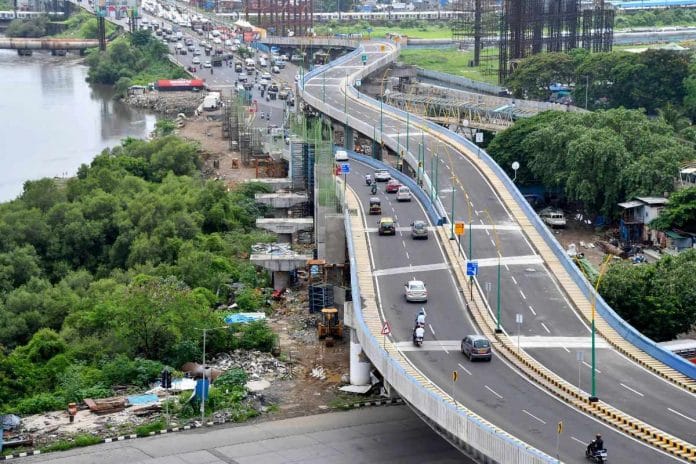Mumbai: With its land bank drying up, the Mumbai Metropolitan Region Development Authority (MMRDA) — which is implementing multi-crore infrastructure projects in Mumbai — is looking at several innovative ways to keep its coffers flush, ThePrint has learnt.
MMRDA has, in the past, used its land bank in prime areas of Bandra Kurla Complex (BKC) and Wadala as a cushion for it to be able to take on mega transport infrastructure works. A land bank is a reserve of land that is held by an authority for future development and as a source of revenue.
With a majority of its land now already auctioned off and projects worth over Rs 1.19 lakh crore in the pipeline, the MMRDA is exploring new avenues to raise funds. These include acquiring tolling rights to Mumbai’s entry points, implementing transit-oriented development (which allows for a higher permissible construction area along mass transit corridors for a fee), and possibly securitising its assets.
S.V.R. Srinivas, MMRDA Commissioner, told ThePrint, “The Maharashtra State Road Development Corporation (MSRDC) has the right to collect toll at the five entry points of Mumbai till 2027. But we are now implementing multiple capital-intensive projects that will greatly improve connectivity within the city, so we have proposed that we (MMRDA) get the tolling rights after 2027.”
“We are also looking at transit-oriented development in a big way. Developers are anyway going to benefit because of the mass-transit corridors. We should also be able to funnel some of the benefits back for the city’s development,” Srinivas said.
Moreover, the MMRDA is also planning to monetise its assets to raise funds and pay back loans taken for these works. All the proposals were discussed at length at MMRDA’s authority meeting, chaired by Maharashtra Chief Minister Eknath Shinde, last month. ThePrint has seen the minutes of the meeting.
Also read: Budget doubled over 5 years, Rs 63,000 crore Versova-Virar sea link to be Mumbai’s costliest so far
MMRDA’s land bank
The BKC, sprawled across 370 hectares, and a notified area of 126 hectares at Wadala, are like the MMRDA’s family silver. The government agency relies on these to fund part of its infrastructure projects.
BKC has, over the years, evolved as Mumbai’s prime business hub, where more than two lakh people work in government offices as well as private and multinational companies. It also boasts of many five-star hotels, the National Stock Exchange (NSE), a diamond bourse, and a large convention centre. The MMRDA has been the special planning authority for BKC since 1977.
In last month’s meeting, the MMRDA decided to invite bids to auction off two more plots in BKC that are expected to fetch Rs 2,928.25 crore for an 80-year lease.
Last year, too, the MMRDA had leased two of its Bandra Kurla Complex plots that earned the government authority Rs 2,067 crore altogether.
An MMRDA official, who did not wish to be named, said the MMRDA is taking up projects worth Rs 1.19 lakh crore for development — these include a Versova-Virar sea link, the Thane coastal road, and an extension of the Eastern Freeway, among others.
“Until now, while creating infrastructure in the larger Mumbai Metropolitan Region (Mumbai’s urban agglomeration), the MMRDA has mostly relied on its land bank. As an exception, for some projects, the MMRDA has taken loans from external sources, such as institutions of the Union government. But this land bank is soon getting exhausted,” the official said.
“There is an urgent need for us to think about other sources of revenue to fund the upcoming infrastructure projects,” he added.
Immediately, the MMRDA plans to auction two plots — one sized 7,071.90 square metres and another 6,096.67 square metres — on an 80-year lease for commercial development.
The authority also plans to invite tenders to build and run a club house in BKC based on a membership subscription fee, a helipad, and a banquet lawn in return for a fixed annual fee to the authority.
Tolling, transit-oriented development
In the authority meeting chaired by CM Shinde last month, the MMRDA got an in-principle approval to take over the tolling rights at the five entry points of Mumbai after 2027, when the MSRDC’s right to collect toll ends.
The MSRDC, another government agency in charge of creating road infrastructure across the state, was given the rights to collect toll at the five entry points to Mumbai to compensate the agency for building 55 flyovers in Mumbai between 1995 and 1998.
“We plan to improve the tolling system by putting in an open road tolling in place. This will ease traffic congestion,” Srinivas said.
In an open road tolling system, there are no traditional toll booths and the mechanism detects vehicles in motion and deducts tax. The MMRDA, according to reports, is first planning to introduce the open road tolling (ORT) system on the under-construction Sewri-Nhava Sheva Mumbai Trans Harbour Link, expected to be completed by December this year.
According to the meeting’s minutes, the MMRDA Commissioner will also identify other potential locations in the Mumbai Metropolitan Region where a toll tax needs to be levied and send a proposal to the state government.
The MMRDA is also hoping to raise Rs 1,300 crore per year from premiums on additional Floor Space Index (FSI) on development in a specified influence area along mass transit corridors. MMRDA officials say a proposal was sent to the state government in 2020 regarding implementing the transit-oriented development model on a pilot basis on the Dahisar East-Andheri East Metro corridor, which Prime Minister Narendra Modi inaugurated in January this year.
The proposal had been in cold storage until now, but in last month’s meeting, it was decided that the MMRDA will follow up on the proposal with the state government.
(Edited by Zinnia Ray Chaudhuri)
Also read: How Maharashtra plans to make Mumbai & satellite towns a 250 billion-dollar economy in 5 yrs






